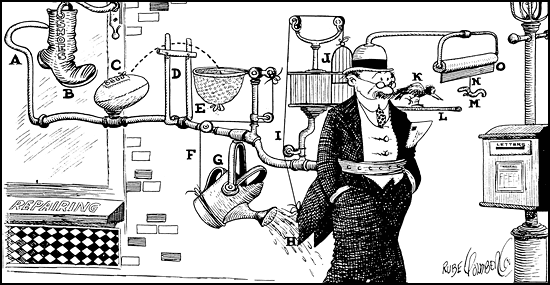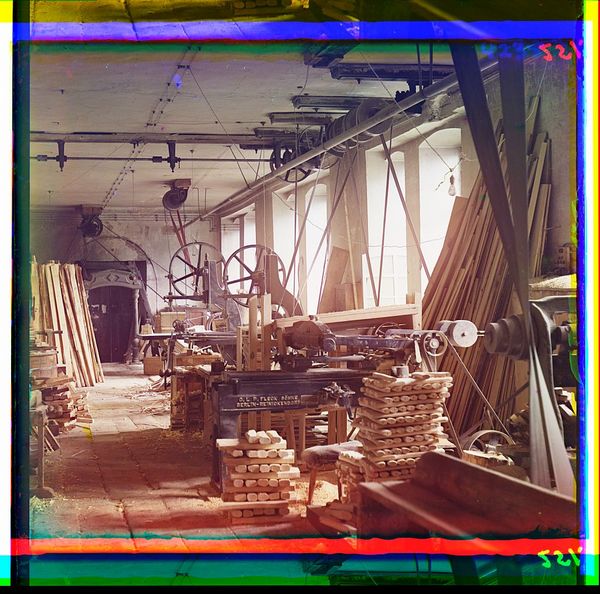Rube Goldberg and the Irreducible Strangeness of Electricity
Rube Goldberg was shockingly popular in his heyday. His brilliant "Inventions" series was nationally syndicated beginning in the teens and his style became one of the most instantly recognizable in the nation. He gave his name to our lexicon.
None of Goldberg's mythical machines is remotely practical. "As we move forward along the gadget-strewn path of mechanization we become more and more aware of the general theme, DO IT THE HARD WAY," he once wrote. "The more trivial the product, the more complicated machine."
The cartoons both send-up and memorialize the crazed inventors of America, a breed that was already decreasing in importance by the time Goldberg reached a national audience. Certainly that's a huge part of their appeal.
But I want to suggest that there was something else going on, too. Goldberg's inventions are, fundamentally, mechanical jokes. You can see the chain of events. An action begets a reaction which gets another reaction, and on it goes. That's how mechanical things work. If you want to move something, you need to pull it or push or rotate it with another thing. If you want to move something big, you need a big thing or something moving fast.
We humans understand all this intuitively. All the action is at the macro level and you can see what's happening.
In the mechanical era, basically every factory had to run a bit like a Rube Goldberg machine. Here, an old version of Encyclopaedia Britannica instructs us on how you might transmit power from a water wheel or a steam engine to the machines of a manufactory.
The mechanical transmission of power is effected by means of belts or ropes, by shafts or by wheel gearing and chains... The problems involved in the design and arrangement of the mechanisms for the mechanical distribution of power are conveniently approached by the consideration of the way in which the mechanical energy made available by an engine is distributed to several machines in the factory. By a belt on the fly-wheel of the prime mover the power is transmitted to the line shaft, and pulleys suitably placed along the line shaft by means of other belts transmit power, first, to small countershafts carrying fast and loose pulleys and striking gear for starting or stopping each machine at will, and then to the driving pulleys of several machines.
Electricity, or humans ability to channel and use electricity, changed all that. This week, electricity nerds celebrated Michael Faraday's birth in 1791. His discoveries in the fundamental properties of electromagnetism were one of the foundations of the electrical revolution that came around the turn of the 20th century. Here, Wired's Randy Alfred describes his famous 1821 experiment:
In his most famous experience, "Faraday suspended a wire above a magnet. When he passed a current through the wire (whose bottom end hung in a dish of conductive mercury), the wire rotated around the magnet, following lines of magnetic force. It was a prototype for the electric motor, using electricity to create motion.
We don't give this operation credit for being as weird as it is. Charles Eliot once wrote, "Electricity: carrier of light and power, devourer of space and time, bearer of human speech over land and sea, greatest servant of man--yet itself unknown." We understand what electricity does for us, but we don't understand it.
Think about it. You've got a wire and you've got a magnet. Switch on the current -- which you can't see and have no intuitive way to know exists -- and suddenly the wire begins to rotate around the magnet. You can reverse the process, too. Rotate the magnet around the wire and it generates a current that can be turned into light, heat, or power.
We were suddenly tapping invisible forces. Just looking at something couldn't tell you exactly what was happening anymore. Anytime you had electricity, you could make something rotate, which means you had an engine, and any time you could rotate some magnets, you could have electricity.
People at the time, and throughout the 19th century, certainly thought electricity was a mysterious force. People often described "the wonder of electricity" but part of what caused that wonder was a lack of understanding. A weekly journal, The Chronicle, argued in 1888 that a horse could kill a man and no one thought anything of it, but if an electric wire did the same, "Instantly up goes the cry from every spectator, the deadly wires are threatening the lives of the public; and why? Because the electric light wire, in the estimation of the general public, possesses baleful and almost supernatural powers for mischief."
But The Chronicle guessed (rightly) that eventually people would get used to electricity. And we did.
And that brings us back to Rube. The popularity of his inventions series closely parallels the rise of electrification in America. In 1925, depending on where you lived, between 20 (a place like Tennessee) and 60 percent (a place like Pennsylvania) of homes had electricity. Power was receding into the walls. The world lost a little explicability. People like to complain that they can't understand modern cars because of all the fancy parts and electronic doo-dads in them now, but we lost that ability for most things long ago.
I think Goldberg's drawings reminded his contemporaries of a time when they could understand the world's industrial processes just by looking. No matter how absurd his work was, anyone could trace the reactions involved. They were open to inspection, transparent.
As the electric power industry scaled up and centralized, the plant that rotated the magnets to create the current that you use got farther and farther away. Now, you no longer even have to think about where the energy you use comes from. You can forget that your laptop is really plugged into a network of magnets being pushed around by steam created by the heat of burned fossil fuels or the fissioning of atoms.


